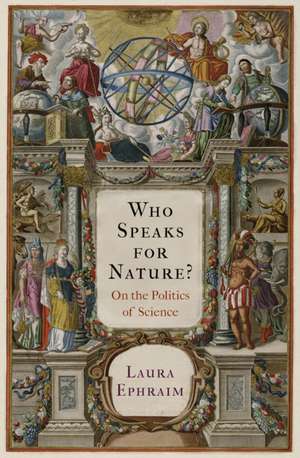Who Speaks for Nature? – On the Politics of Science
Autor Laura Ephraimen Limba Engleză Hardback – 19 dec 2017
In Who Speaks for Nature?, Laura Ephraim reveals the roots of scientific authority in what she calls world-building politics: the collection of practices through which scientists and citizens collaborate with and struggle against each other to engage natural things and events and to construct a shared yet heterogeneous world. Through innovative readings of some of the most important thinkers of science and politics of the near and distant past, including Ren Descartes, Thomas Hobbes, Giambattista Vico, and Hannah Arendt, Ephraim argues that the natural sciences are political because they are crucial sites in which the worldly relationships that bind together the human and nonhuman are inherited, augmented, and reconstructed.
Who Speaks for Nature? opens a novel conversation between political theory, science, and technology studies and augments existing efforts by feminists, environmentalists, and democratic theorists to challenge the traditional binary separating nature and politics. In an age of climate change and climate-change denial, Ephraim brings theoretical understandings of politics to bear on real-world events and decisions and uncovers fresh insights into the place of scientists in public life.
Preț: 429.93 lei
Nou
Puncte Express: 645
Preț estimativ în valută:
82.26€ • 86.12$ • 68.07£
82.26€ • 86.12$ • 68.07£
Carte tipărită la comandă
Livrare economică 07-21 aprilie
Preluare comenzi: 021 569.72.76
Specificații
ISBN-13: 9780812249811
ISBN-10: 081224981X
Pagini: 200
Dimensiuni: 161 x 236 x 25 mm
Greutate: 0.41 kg
Editura: MT – University of Pennsylvania Press
ISBN-10: 081224981X
Pagini: 200
Dimensiuni: 161 x 236 x 25 mm
Greutate: 0.41 kg
Editura: MT – University of Pennsylvania Press
Notă biografică
Laura Ephraim teaches political science at Williams College.
Descriere
Laura Ephraim reveals the origins and limits of scientists' remarkably resilient yet controversial authority to speak for nature. Through innovative readings of Descartes, Hobbes, Arendt, and others, she uncovers fresh insights into contemporary dilemmas surrounding the place of scientists in public life and environmental politics.
